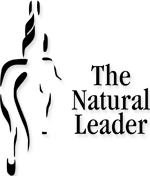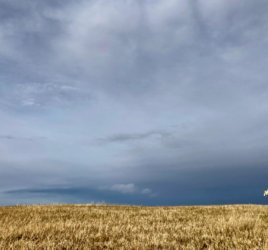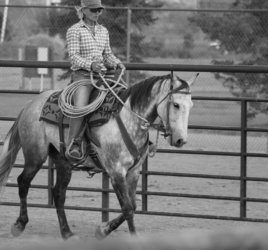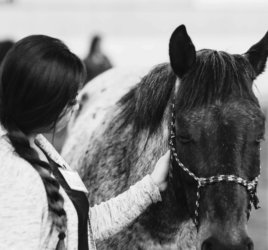The following is an excerpt from my new book Leadership is NOT a Wardrobe Issue. Exploring life lessons on horsemanship and how those learnings apply through the leadership programs of The Natural Leader. A fifteen-year veteran of the experiential equine learning industry Nancy has delivered hundreds of programs to thousands of individuals.
What’s a better question?
Questions can improve learning, encourage exchange of ideas, fuel innovation and improve performance. So how do you ask better questions in order to build rapport and trust with a client or among team members?
We often approach asking questions the way a lawyer would: to provide answers in support of what we already know, to ensure specific outcomes or confirm a bias. In coaching with horses, or pretty much any situation, we need to ask questions the way a scientist would—questions that invite curiousity, vulnerability and honesty.

In the 1970’s Alison and Harvard University colleagues conducted research on asking questions.(1) They determined we ask questions with two main goals, to unlock learning or improve likeability. While the focus of their research was whether a person might be interested in dating the individual who asked the questions, they found the more follow-up questions someone asked, the more likely the other person found them to be likeable.
The volume of questions is of course not the most important aspect, but rather the type, tone, sequence and context of the questions.
In working with a horse many people are way outside their comfort zone, so they need to feel that they are being heard. The questions you ask might follow two different approaches.
Approach One: Introductory Questions These soft opening questions are a great approach in a one-on-one coaching situation, as they are questions people generally enjoy answering. As the person gains comfort, gradually introduce questions that delve deeper and require them to reflect on how their actions move from the arena to the workplace.
Approach Two: Tough Questions Without the luxury of time for gradual questioning in a group leadership program, you might just have to start with tough questions. Questions that help someone see the obvious—what it is they’re doing and what they may need to change.
Either way, you are looking to unlock learning, get people to open up and be curious, and help them see how what’s happening for them now relates back to the workplace—or as we have often found, to life in general.
Sometimes they don’t know what they don’t know

Having people ask a question is a great way to begin a debrief. Because when you begin with a question, the same people typically speak up. When you ask participants to come up with a question, you have offered up a coaching opportunity.
Challenging people to ask questions means they have to get creative about the problem. They get to practice asking better questions. I find these debriefs fascinating—people really take on responsibility for their own learning. The most challenging part is keeping things on schedule!
The Alison and Harvard University colleagues set out to determine likability, as a leader your goal is more likely to bring out the best in another or help a team to become more effective. Closed-ended questions are generally easier to ask, and answer. Open-ended questions are where we demonstrate curiosity, our own vulnerability, and provide the opportunity to unlock learning potential. Asking good questions takes time, it is a skill you develop and it takes practice. Lots of practice!
—————
Nancy Lowery has been blogging on leadership learnings through her horsemanship for over fifteen years. Leadership is NOT a Wardrobe Issue is a culmination of a lifetime of learning and speaks to why some learning simply takes a lifetime.
For more information about Leadership is NOT a Wardrobe Issue or The Natural Leader programs contact Nancy Lowery at nancy@TheNaturalLeader.ca or 403.669.3666 More information can be found at www.TheNaturalLeader.ca – our next open program The Reins of Responsibility is October 3,
1- Alison and Harvard – It Doesn’t Hurt to Ask: Question-Asking Increases Liking; Huang, Karen; Yeomans, Michael; Wood-Brooks, Alison; Minson, Julia; Gino, Francesca, Journal of Personality and Social Psychology 2017, Vol. 113, No.3, 430-452. https://www.hbs.edu/faculty/Publication%20Files/Huang%20et%20al%202017_6945bc5e-3b3e-4c0a-addd-254c9e603c60.pdf



